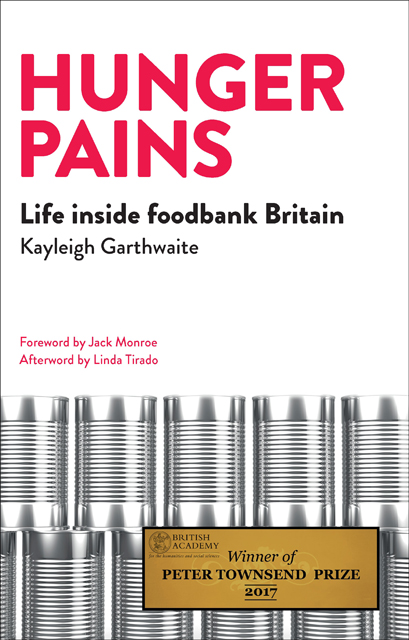Book contents
- Frontmatter
- Dedication
- Contents
- List of figures and boxes
- Acknowledgements
- Foreword by Jack Monroe
- Introduction
- one Researching foodbank use
- two Foodbanks: what do they do?
- three The politics of foodbank use in the UK
- four Why do people use a foodbank?
- five All work, low pay: finding, keeping and doing precarious jobs
- six “Doing the best I can with what I’ve got”: food and health on a low income
- seven Stigma, shame and “people like us”
- Conclusion: is foodbank Britain here to stay?
- Afterword by Linda Tirado
- Notes
- Bibliography
- Index
Afterword by Linda Tirado
Published online by Cambridge University Press: 15 April 2023
- Frontmatter
- Dedication
- Contents
- List of figures and boxes
- Acknowledgements
- Foreword by Jack Monroe
- Introduction
- one Researching foodbank use
- two Foodbanks: what do they do?
- three The politics of foodbank use in the UK
- four Why do people use a foodbank?
- five All work, low pay: finding, keeping and doing precarious jobs
- six “Doing the best I can with what I’ve got”: food and health on a low income
- seven Stigma, shame and “people like us”
- Conclusion: is foodbank Britain here to stay?
- Afterword by Linda Tirado
- Notes
- Bibliography
- Index
Summary
If you’ve made it this far, one of two things is true. Either you’re outraged and wondering what the hell we’re meant to do now, or you’re actually made of stone and think that data and evidence are a left-wing Marxist plot. A possible third: you already knew all of this and you’re too tired to muster anything much like outrage. Here is what you can do: be kind. Really, honestly, unselfishly kind. Smile at a homeless person and say “Sorry, mate, I don’t carry cash”, instead of ignoring the human who is hoping for a few quid. Recognise the humanity of people who have it hard. It’s not your job to solve all of human misery – just not to cause any if you can help it. We, those of us who have spent decades of our lives scrubbing public toilets and smiling while people heaped abuse and condescension on our heads – it’s not money we’re after. We don’t need to live in a house featuring Ionic columns to be happy. We need for people who do to stop pretending we’re not as human as everyone else simply because we live in a council flat.
This book, this author, this work is how we start to fix things. We stop allowing people to define us: we bring them the data. So you think we’re not trustworthy, our lived experience doesn’t count against the opinions you’ve formed about it? Fine. Here’s the science. Here’s the data. Here are the millions of lives denigrated and set aside as worthless. Here, then, is what you are responsible for. This is the society that you have created, that you support, that you live in, that you benefit from. I write a lot on this topic, and I find myself often stuck for words, new and interesting ways to say the following: there is something seriously wrong here. We’ve got to fix it. We’ve got to do better. We have to live up to the things we like to believe about ourselves: that we live in progressive, egalitarian societies. That we consider things like human dignity and worth. That we don’t simply write off nearly a third of society, because we recognise that all jobs need doing and the people who do them are as valuable as those who do any other.
- Type
- Chapter
- Information
- Hunger PainsLife inside Foodbank Britain, pp. 161 - 162Publisher: Bristol University PressPrint publication year: 2016



